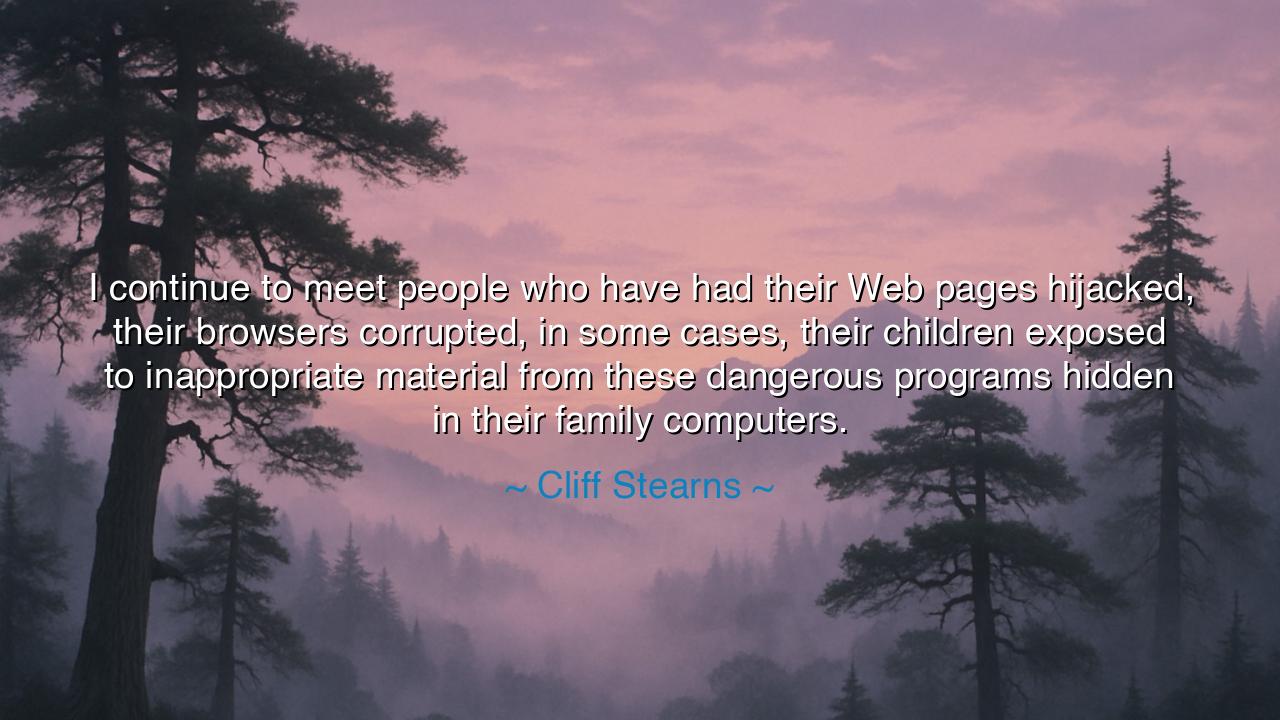
I continue to meet people who have had their Web pages hijacked
I continue to meet people who have had their Web pages hijacked, their browsers corrupted, in some cases, their children exposed to inappropriate material from these dangerous programs hidden in their family computers.






In the age of technology, where the boundaries between the digital world and our daily lives have become almost indistinguishable, the threats that lurk in the shadows of the Internet have grown ever more insidious. Cliff Stearns, in his words, offers a stark warning: "I continue to meet people who have had their Web pages hijacked, their browsers corrupted, in some cases, their children exposed to inappropriate material from these dangerous programs hidden in their family computers." These words, spoken with the gravity of one who has seen the consequences of cybercrime, reflect the growing dangers that many face in an increasingly interconnected world.
At the heart of this warning lies a deep concern for the safety of individuals and families in the digital age. In the same way that ancient civilizations built walls and barriers to protect their cities from invaders, we must now build defenses around our personal lives, our homes, and our children. The Internet, like a vast and ever-expanding ocean, can offer opportunities for growth, connection, and discovery. Yet, beneath its surface, it harbors dangerous currents—from malware to online predators—that can swiftly carry us away if we are not vigilant.
Consider the ancient walls of Babylon, which stood as both a symbol of civilization and a bulwark against external threats. The city’s fortifications were not merely physical—they were also a reflection of the society’s desire to protect itself from harm. Yet, despite their strength, Babylon fell to the Persians, who found a way to breach those walls through cunning and innovation. In the same way, our digital walls—our firewalls, passwords, and security systems—are only as strong as our awareness and vigilance. Malicious programs—hidden deep within seemingly innocuous software—are the modern-day invasions, the unseen forces that seek to undermine the sanctity of our digital lives. Just as the Babylonians learned to fortify their city, we too must learn to fortify our digital spaces.
The tragic story of Kevin Mitnick, once one of the most famous hackers in history, serves as a modern-day cautionary tale. Mitnick was able to infiltrate systems and steal sensitive information not by brute force, but through clever manipulation and deceit. He exploited the vulnerabilities of human behavior, much like the malicious programs that now exploit the vulnerabilities in our computer systems. Kevin’s actions, though illegal, were a reflection of the evolution of our digital landscape—a world where the unwary and unprepared are exposed to dangers they might not even understand. Mitnick’s story highlights the need for constant awareness and vigilance in a world where our personal data, our identities, and our very safety can be compromised with a single click.
Indeed, Stearns' warning is not just about viruses or hijacked web pages—it is a plea for greater responsibility and education in the digital age. In the same way that ancient philosophers taught their students the importance of ethics, we too must teach our children the importance of digital literacy—the understanding of the dangers that exist in the vast realm of the Internet. Just as the ancient Greek philosopher Socrates warned of the dangers of unchecked knowledge, we must warn of the dangers of unchecked access. To navigate this digital world safely, we must be armed not only with the tools of protection but with the wisdom to use them effectively.
In the ancient world, the wisdom passed down from generation to generation was often embodied in the form of fables and parables, meant to instill values and lessons in the minds of the youth. So too must we seek to protect our own, not only by installing firewalls or anti-virus software, but by ensuring they understand the deeper implications of the digital world they are entering. Just as the young warriors of Sparta were trained in both the art of war and the art of discipline, so must our children be trained in the art of cybersecurity and the discipline of wise digital citizenship.
The lesson, therefore, is one of vigilance, of balance, and of proactive protection. Just as the walls of Babylon were built stone by stone, so too must we build our defenses, both in the digital realm and in the hearts and minds of those we wish to protect. The modern world offers us endless possibilities, but with those possibilities comes the need for wisdom and foresight. As we move forward in this age of technology, let us remember that the greatest power lies not just in the tools we use but in the knowledge we carry, the wisdom we pass down, and the vigilance we maintain in ensuring that we, and our families, are safe from the dangers that lurk unseen in the world of the Web.






AAdministratorAdministrator
Welcome, honored guests. Please leave a comment, we will respond soon